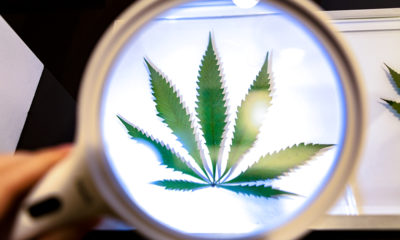
Medical
NY Opens Its MMJ Dispensaries, Patient Base Grows
New York’s dispensaries have been open for 10 days, since Jan. 7, and already the state’s medical marijuana program is seeing exponential growth in the number of patients registered to receive care.
Last Friday, Jan. 8, after only one day of business, the state had 71 registered patients and 174 registered doctors. But by Tuesday Jan. 12, the state had 166 certified patients and 226 registered doctors, according to an update from the state’s Department of Health.
However, compared to the growth other states saw after they legalized medical marijuana, New York’s growth is quite stunted. New York’s medical marijuana program, which became effective when Governor Andrew Cuomo signed the bill over the Fourth of July weekend in 2014, has made headlines across the country for its highly restrictive nature.
Only 10 conditions allow patients to qualify for medical marijuana in the Empire State, including cancer, epilepsy, HIV or AIDS, Parkinson’s and Huntington’s disease and ALS. The state’s program also requires that patients with those 10 conditions must one of the five listed “associated or complicating conditions” — severe or chronic pain, severe nausea, seizures, wasting syndrome, or severe or persistent muscle spasms. The Department of Health Commissioner, Dr. Howard Zucker, also stated on Monday that he would not to expand the list of qualifying conditions to include PTSD, Alzheimer’s disease, muscular dystrophy, dystonia and rheumatoid arthritis, citing an insufficient body of evidence.
“Our program ensures the availability of pharmaceutical-grade medical marijuana products for certified patients and establishes strict regulatory controls to protect public health and safety,” said Zucker in a press release. He also stated that he was “pleased” to have met the goals and “ambitious timeline” laid out by Governor Cuomo.
New York’s medical program also stipulates that doctors must take an expensive four hour long course to become registered to prescribe the medicine, and smokable marijuana remains illegal in the state — so dispensaries will only have capsules, oils and tinctures.
“Some people call this model conservative or restrictive, but I think the most appropriate name is a medical model, and I think New York’s model is one that other states will follow over time,” said Ari Huffnung, the CEO of Vireo Health of New York, one of the five medical cannabis companies licensed to operate in New York. “Some segments of the patient population in every state have some type of negative perceptions or stigmas it associates with medical cannabis, and having medical cannabis products in the form of capsules and oils will help send a message to patients that these products are very similar to other products patients are used to.”
Huffnung added that he believes New York is going to offer “a fundamentally different experience to patients,” because dispensaries will not sell joints or pot brownies, will not have products branded with names like “AK-47” and will have trained and experienced pharmacists, rather than budtenders.
In July 2015, the state granted licenses to five companies, including Huffnung’s Vireo Health of New York, to grow, manufacture and distribute marijuana at four dispensaries each on a rolling basis around the state. Each dispensary group had to pay $200,000 to register with the state. On Jan. 7, only eight of the 20 dispensaries opened across the state, including in Manhattan, White Plains, Albany, Kingston, two in the Buffalo area and two near the Finger Lakes, according to the New York Times.
Vireo Health opened in White Plains on Jan. 7, and will be opening its other three locations before the end of the month. Huffnung said that he was not surprised by the small numbers of patients enrolled in the state’s medical program, and that he is not worried about future sales.
“We fully expect that over time, the number of patients will increase significantly and the number of physicians who are registered with also increase significantly,” Huffnung said. “If you look at medical marijuana markets that have predated New York, such as larger markets like California and Colorado, you’ll see that the enrollment levels usually range between one to two percent of the population. For a state like New York with 20 million residents, we expect that we’ll have 200,000 or more patients.”
One thing that might draw more patients to Vireo Health: their certified kosher marijuana. As New York has the largest Jewish population in the United States, it seems only fitting that New York’s medical marijuana industry would be the first in the world to house products that won certification from the Orthodox Union.
“It’s our hope that having a prominent religious group certify our products,” Huffnung said, “we’ll send a message to New Yorkers of all faiths and backgrounds that there’s nothing to be ashamed about medical cannabis.”
Is New York’s medical marijuana program too restrictive? Tell us what you think.
























